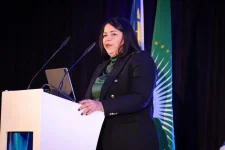Bank Program Helps Namibian Students Learn Tech Skills,
The Bank of Namibia has brought science and tech learning to eight high schools, teaching 480 students. The bank's deputy head, Leonie Dunn, spoke about this success on Thursday as she gave school money to 10 students.
"From the start, we have helped students learn key skills for the future," Dunn said. Students made useful things to fix problems in their areas. One student from the south made a way to find bad food. This helps stop people from eating things that might make them sick. Another student built a door that locks by itself to keep homeless people safe from cold weather.
The bank wants to help students in far-off places learn about computers and new tools. "City kids can learn about robots and computer code," Dunn said. But students in places like Kurunkuru need these chances." The bank's plan ensures that rural students can learn new skills.
The bank works with the school office and other groups to reach more students. "New tools keep changing fast," Dunn said. "Schools take time to change what they teach. Banks like us must help fill these gaps."
Dunn thinks Namibia needs workers who know about new tools to make its money grow. She asked other banks to join in helping students learn. "We have helped 480 students, but Namibia has more than 900,000 school kids," she said. "More help means more students can learn these skills."
The bank's work shows how businesses can improve schools. By teaching science and tech skills, it helps students prepare for future jobs.
The Bank of Namibia has brought science and tech learning to eight high schools, teaching 480 students. The bank's deputy head, Leonie Dunn, spoke about this success on Thursday as she gave school money to 10 students.
"From the start, we have helped students learn key skills for the future," Dunn said. Students made useful things to fix problems in their areas. One student from the south made a way to find bad food. This helps stop people from eating things that might make them sick. Another student built a door that locks by itself to keep homeless people safe from cold weather.
The bank wants to help students in far-off places learn about computers and new tools. "City kids can learn about robots and computer code," Dunn said. But students in places like Kurunkuru need these chances." The bank's plan ensures that rural students can learn new skills.
The bank works with the school office and other groups to reach more students. "New tools keep changing fast," Dunn said. "Schools take time to change what they teach. Banks like us must help fill these gaps."
Dunn thinks Namibia needs workers who know about new tools to make its money grow. She asked other banks to join in helping students learn. "We have helped 480 students, but Namibia has more than 900,000 school kids," she said. "More help means more students can learn these skills."
The bank's work shows how businesses can improve schools. By teaching science and tech skills, it helps students prepare for future jobs.












